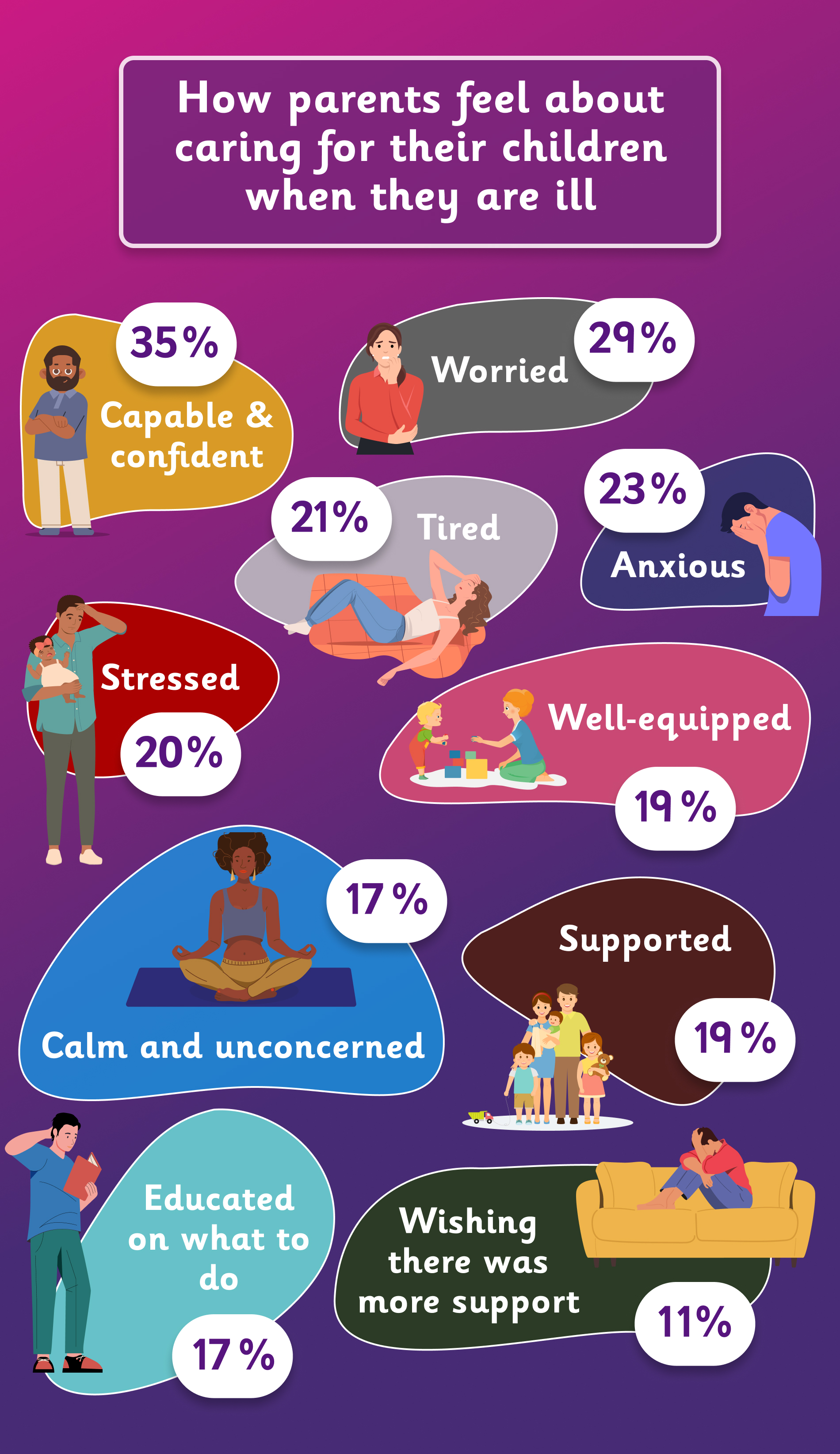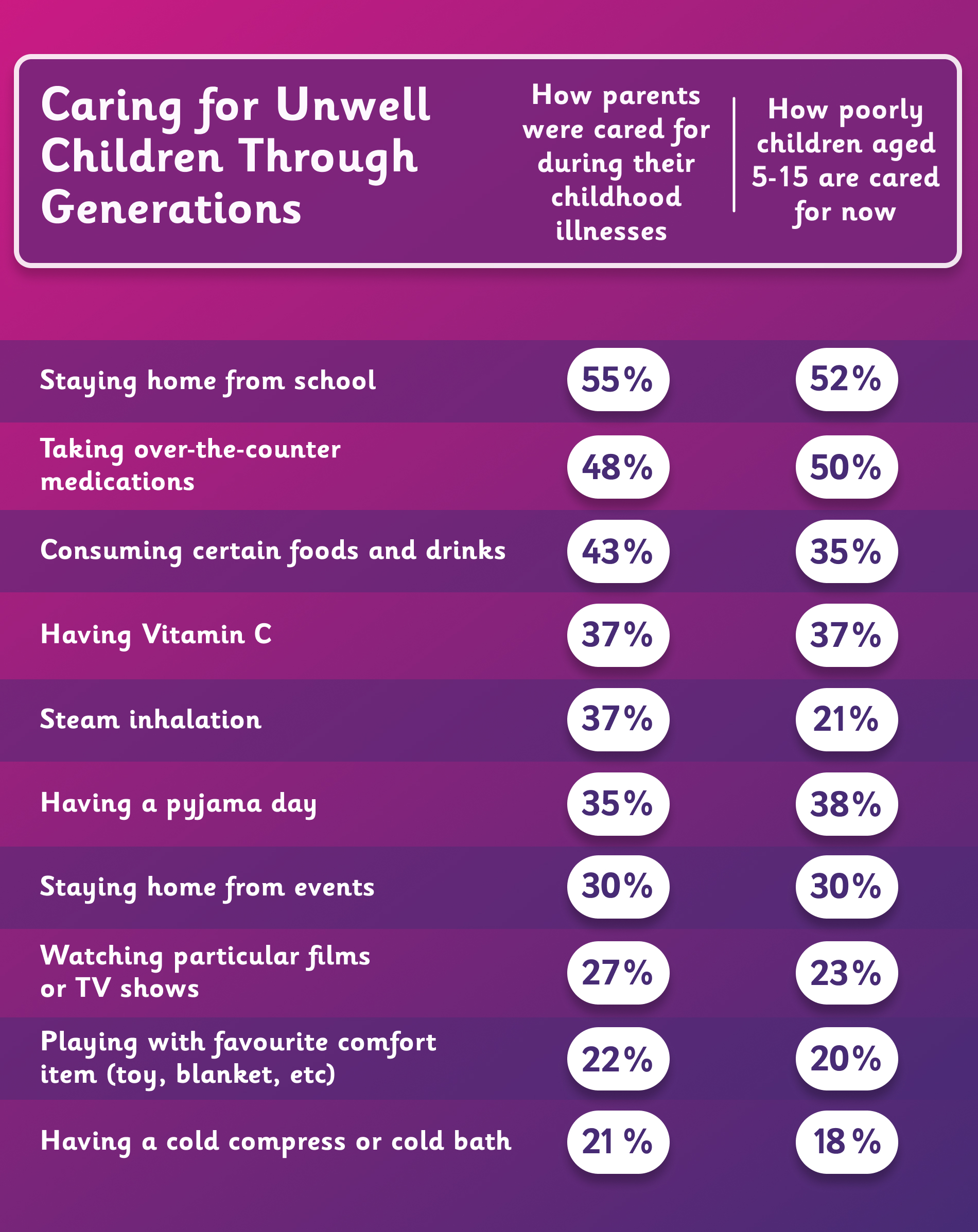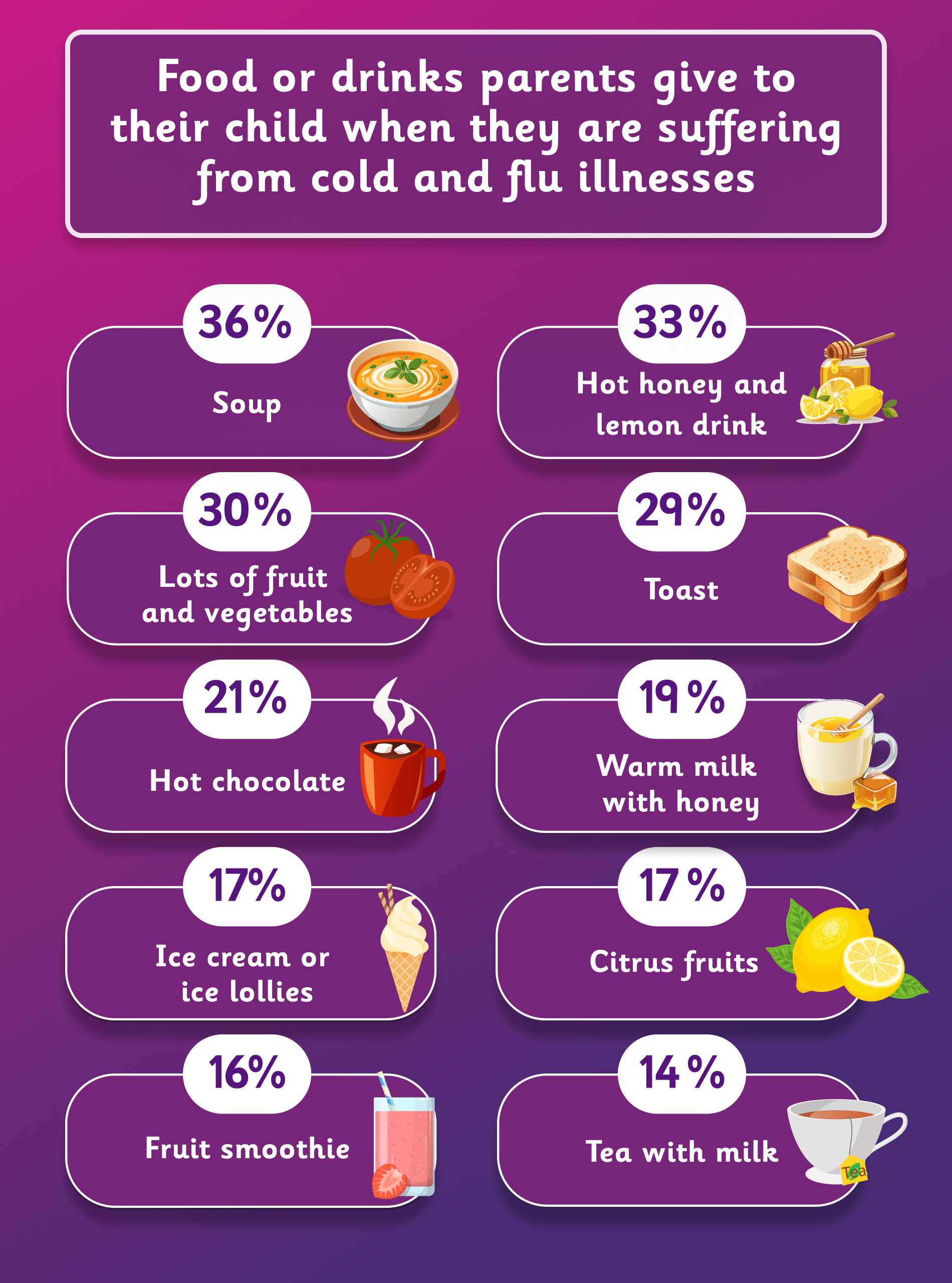Caring for a Poorly Child | Calpol®
Traditional Remedies vs. Modern Methods: What Works For Parents When Caring for a Poorly Child?
From generation to generation, parents have passed down different health remedies for treating coughs, flus, and the common cold. You might have heard of such old wives’ tales like ‘starving’ a fever, or ‘feeding’ a cold, or relying on a warm bowl of chicken soup to cure the sniffles. But how are times changing when it comes to treating sick children today?
To get a clearer picture, we surveyed 2,000 UK parents with children aged five to 15 on how they provide comfort, juggle responsibilities, and deal with the emotional toll of caring for a poorly child.
How parents help their little ones when they need it the most
For many parents, taking care of a sick child is part of the parenting role. But how confident do they feel when illness strikes? Our survey shows that about one in three parents feel confident in caring for their children. However, a large number also experience feelings of worry, stress, and anxiety.

ᴱᵐᵒᵗᶦᵒⁿᵃˡ ʳᵉˢᵖᵒⁿˢᵉˢ ᶠʳᵒᵐ ᵗʰᵉ ᶜᵃˡᵖᵒˡ ˢᵘʳᵛᵉʸ ᵒᶠ ²,⁰⁰⁰ ᵁᴷ ᵖᵃʳᵉⁿᵗˢ ʷᶦᵗʰ ᶜʰᶦˡᵈʳᵉⁿ ᵃᵍᵉᵈ ᶠᶦᵛᵉ ᵗᵒ ᶠᶦᶠᵗᵉᵉⁿ
Mums tend to worry more (34% vs. 22% of dads) and are also more likely to feel anxious (25% vs. 19%) and tired (24% vs. 16%). Younger parents (aged 25 to 34) also seem to worry more compared to their older counterparts (55 to 64). This difference (31% vs 22%) might have to do with the fact that older parents tend to have hands-on experience with a previous child.
How parents balance responsibilities when their child is sick
It’s not just your emotions that are affected when your child is poorly, but your daily routine might go out the window too. Our survey shows that a third of parents (32%) have had to call in family members to help. Meanwhile, others have had to take parental leave from work to stay home with their little ones. Only a few parents (15%) tried to stick to their normal routine, while 28% had to reshuffle their tasks to fit around caring for their sick child.
Who do parents turn to for advice?
UK parents aren’t shy about reaching out for advice. More than half (61%) said they would turn to a doctor or healthcare expert, while 39% would turn to their own parents, reinforcing the importance of health advice being passed down from generation to generation.
Interestingly, only a small percentage of parents (15%) rely on parenting books or guides, and only 12% look at online blogs for advice.
How do parents handle criticism about their care methods?
Today’s society seems to be more understanding around the stress of caring for a sick child. From our survey, six in ten parents say they don’t face any criticism or challenge surrounding care methods they use. And when they do – mainly from healthcare professionals – 78% of parents find this feedback to be either fairly or very helpful. Even family criticism, which can at times feel personal, is seen as helpful by more than half (59%).
Popular home remedies passed down through the years
We also explored some of the most popular home remedies for child sickness parents love to turn to. We asked parents to recall some of these childhood remedies and compare them with how they care for their children today.

ᶜᵃʳᵉ ᵐᵉᵗʰᵒᵈ ʳᵉˢᵖᵒⁿˢᵉˢ ᶠʳᵒᵐ ˢᵘʳᵛᵉʸ ᵒᶠ ²,⁰⁰⁰ ᵁᴷ ᵖᵃʳᵉⁿᵗˢ ʷᶦᵗʰ ᶜʰᶦˡᵈʳᵉⁿ ᵃᵍᵉᵈ ᶠᶦᵛᵉ ᵗᵒ ᶠᶦᶠᵗᵉᵉⁿ
More than half of parents agree with keeping their child at home when they are poorly, just like when they were kids. Half also recall getting over the counter medication, and continue to use them now to treat their children.
Women are more likely to keep children home from school (60% vs. 39% of men) and rely on comforting strategies like pyjama days (48% vs. 22%). Overall, staying at home is extremely popular, emphasising the importance of rest and preventing spread of disease.
What about food and drink?
Nutrition seems to take a backseat when children are unwell. Only 6% of parents recall having a special diet or nutrition plan in their childhood to manage their illness, and only one in ten do it with their child now. When shown a list of food and drink parents usually give to their children with cold and flu, these had the highest responses:

ᴺᵘᵗʳᶦᵗᶦᵒⁿᵃˡ ʳᵉˢᵖᵒⁿˢᵉˢ ᶠʳᵒᵐ ˢᵘʳᵛᵉʸ ᵒᶠ ²,⁰⁰⁰ ᵁᴷ ᵖᵃʳᵉⁿᵗˢ ʷᶦᵗʰ ᶜʰᶦˡᵈʳᵉⁿ ᵃᵍᵉᵈ ᶠᶦᵛᵉ ᵗᵒ ᶠᶦᶠᵗᵉᵉⁿ
Nearly half of older parents (43%) aged 55 to 64 say that a honey and lemon drink is their go-to, compared to 33% on average.
Providing love through comfort
Many parents (39%) prefer to stick to the remedies they grew up with – even though almost half (42%) acknowledge that while these methods might not always have medicinal benefits, they certainly make their children feel loved and cared for.
In fact, almost a third (29%) of parents look back on times in their childhood when their own parents cared for them with nostalgia. Only about one in ten (14%) wished their own parents had found better advice on how to care for them when poorly.
So, what’s actually effective?
With the average preschool and primary school child having three to eight coughs and colds per year, it may be common for your child to be poorly with the occasional illness. Some coughs may linger up to two to four weeks, even after other symptoms have gone.
Little ones tend to contract more colds compared to older children. This is because their immune systems are still developing. So, with the occasional bout of illness to be expected, here are a few tips and treatment options to keep them healthy.
Make sure they have enough to drink, as dehydration may develop if your child has fever and they don’t take in a lot of fluids. You can find out more about how high temperatures (fevers) may affect your child from time to time.
It’s common for children to lose their appetite for a few days when sick with a cough or common cold. During this time, frequent, smaller meals can be easier on their digestive system. Aim for hydrating foods like watermelon and strawberries, which provide high amounts of water, fibre, and vitamin C. Eggs can also be a good choice, as they are great sources of protein, zinc, and vitamin D.
Ensure that your child also gets plenty of rest to help their bodies fight off the virus. Make their room feel comfortable by keeping it ventilated and not too warm.
If your child has an irritated or sore throat, you can give them a warm drink with honey and lemon juice to help sooth it. However, honey should not be given to children under the age of 1, due to the risk of infant botulism.
Steam inhalation can be useful in loosening mucus from a cold. The safest way for children to inhale steam is by sitting them in a bathroom with a hot tap or shower running.
Pain management is also important when caring for a sick child. Some home remedies to soothe your little one’s pain include applying a heat pack on the sore area, or giving them warm bath. Over-the-counter medications like ibuprofen or paracetamol can also help, but make sure to stick to the recommended dosage guidance.
For more information on pain management, visit our pain information page.
You can also find out more about treatment options for other regular childhood illnesses by reading our Common Childhood Illnesses Guide.
When to See a Doctor
Most child illnesses, such as coughs and colds, can be managed at home, but don’t hesitate to contact a healthcare professional if you’re ever worried about your child’s symptoms, or if their symptoms persist or get worse.
Conclusion
Most UK parents prefer to strike a balance between traditional home remedies and modern healthcare when their child is poorly. Time-honoured practices are still cherished, but parents aren’t hesitant to seek professional help or turn to modern medicine. These traditional methods are less about treatment and more about comfort, connection, and bonding. It’s a powerful reminder that caregiving is more than just medicine – it’s a moment to strengthen the bond between parent and child.